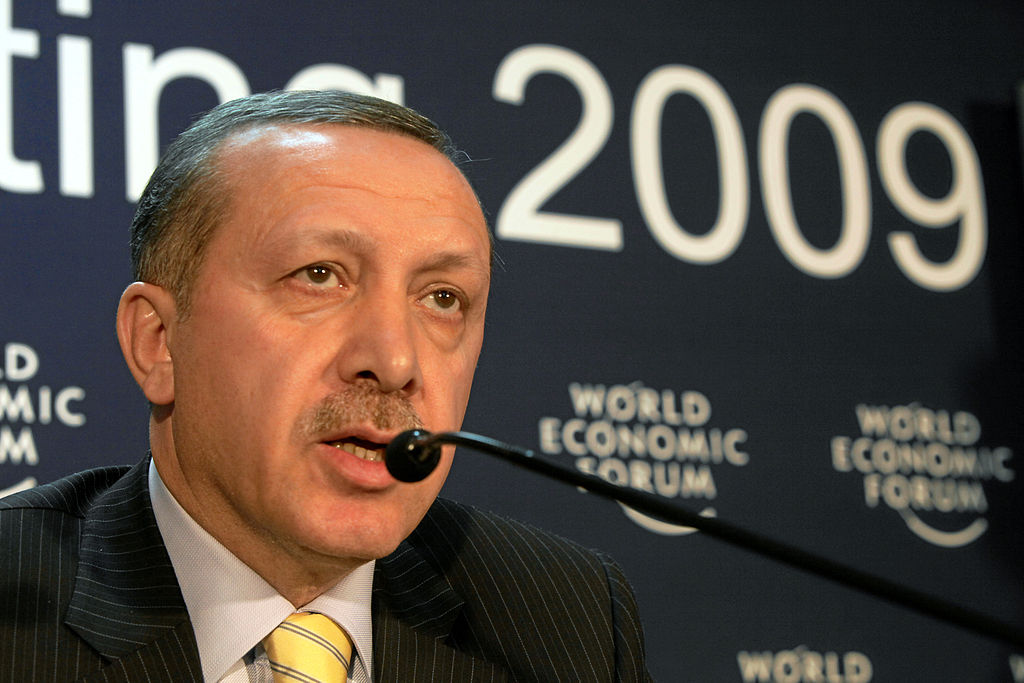World News
Imperiled by militants, Turkey joins NATO, Muslim coalition to destroy Islamic State group

Recep Tayyip Erdogan, President of Turkey. Copyright by World Economic Forum, swiss-image.ch / Photo by Andy Mettler.
WASHINGTON—Turkey is joining its NATO allies and fellow Sunni Muslim nations in a coalition to destroy the Islamic State militant group, moving from reluctance to refusal and finally acceptance. But the world is still waiting for details of any new, specific aid and is warily watching to make sure Ankara keeps its commitments.
Often described as a difficult partner, Turkey long has resisted being used as a launching pad for foreign troops to attack neighbouring nations. Most recently it has been accused of harbouring—or at least helping—Islamic State group militants by letting them traffic fighters, weapons and lucrative oil shipments over its borders.
But the rampant insurgency has put Turkey at peril. The mostly peaceful nation that depends heavily on international tourism is now grappling with a two-fronted threat from militants who have overtaken much of bordering Syria and Iraq, as well as from Kurdish separatists whom Ankara has fought for decades. Moreover, an estimated 1.5 million Syrian and Iraqi refugees have fled to Turkey, where the economy is already fading.
Until this week, Turkey was coy about whether it would contribute to a coalition of what the U.S. says is about 50 countries that have united against the Islamic State group. For months, the world largely gave Turkey a pass as it sought to free 49 of its diplomats, family members and employees who were kidnapped by the militants from the Turkish Consulate in Mosul, Iraq, in June.
The hostages were freed last weekend, prompting the U.S. and other coalition nations to press Turkey on what it would contribute.
President Barack Obama and Turkish President Recep Tayyip Erdogan spoke briefly Thursday in what the White House described as a discussion on “steps we can take to advance our already strong co-operation” against the Islamic State. The two leaders agreed to continue consulting.
“We’ll always get more than people think we’re officially getting, and we’re always going to get less than what we would want,” James F. Jeffrey, former U.S. ambassador to Turkey and Iraq, told a forum this week at the Washington Institute for Near East Policy. “In the end, Turkey will come along.”
Jeffrey was speaking specifically about whether Ankara will let allied forces launch airstrikes from the U.S. air base at Incirlik, located within 100 miles (160 kilometres) of the Syrian border. Yet his words aptly sum up what U.S. officials describe as Washington’s overall relationship with Turkey: a push-and-pull diplomacy that rarely satisfies either nation.
But Turkey finally may now have the upper hand. As it is heavily courted by the U.S. and allies in the West and Mideast to contribute, Turkey is in a better position than ever to demand international support for its own needs—in the name of fighting the Islamic State group.
Even so, Turkey remains a stubborn partner.
On Thursday, Egypt cancelled a meeting between its foreign minister and Turkey’s top diplomat at the United Nations General Assembly, according to Turkish media. The snub came after criticized Egyptian President Abdel-Fattah el-Sissi about last year’s overthrow of the Muslim Brotherhood-led government in Cairo. Erdogan’s political party has ties to the Muslim Brotherhood.
And senior State Department officials say Turkey has yet to pledge any specific new assistance to the coalition, despite a number of continuing meetings on the matter. The officials spoke on condition of anonymity because they were not authorized to discuss the negotiations by name, but Erdogan met Thursday with Vice-President Joe Biden, who greeted the Turkish leader as his “old friend” and congratulated him on the hostages’ release.
Earlier this week, Secretary of State John Kerry confidently announced that “Turkey will be very engaged on the front lines of this effort.” Erdogan affirmed that “we will do our part” and said Turkey’s planned contributions include “everything—both military and political,” according to Turkey’s DHA news agency. The Turkish parliament next week is expected to consider a yearlong extension of cross-border military operations into Iraq and Syria.
At summits this month in Wales and Saudi Arabia, Turkey balked at committing specific assistance, despite its proximity to Iraq and Syria and its unique role as both a NATO partner and overwhelmingly Sunni state. Erdogan has for years espoused a “zero problems with our neighbours” policy that resists military action against its border states.
Syria, however, has tested that policy as Turkey has worriedly watched the brutal tactics of Islamic extremists and Syrian President Bashar Assad’s forces just over its border.
Erdogan says at least 6,000 fighters have been caught coming through Turkey over the past year to join the Islamic State group. Black-market sales of weapons and oil also are moving from the battle zones and into Turkey. The U.S. believes Turkey’s government is not involved, although officials have said Ankara hasn’t done enough to curb the traffic.
Associated Press writers Matthew Lee and Zeina Karam in New York, Desmond Butler in Istanbul and John-Thor Dahlburg in Brussels contributed to this report.





















